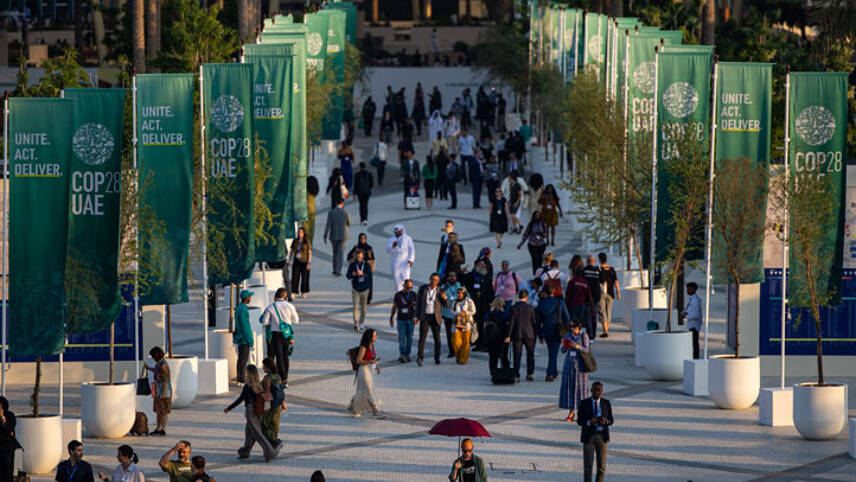This premium content is exclusive to edie Members.
To find out more about edie Membership, please click below.
If you are an existing member, login here

Image: COP28, UNFCCC Flickr/ Christopher Pike
Research published by campaigning environmental NGOs this week suggests so.
Global Witness has claimed that the United Arab Emirates (UAE), the hosts of COP28, sought to close around $100bn of oil, gas and petrochemical deals during 2023. It did so through the state-owned energy company, the Abu Dhabi National Oil Company (ADNOC).
This marked a fivefold increase in the value of international deals reportedly sought year-on-year.
Deals were negotiated with governments and businesses across the world, including recent COP hosts the UK and Egypt and upcoming COP hosts Azerbaijan and Brazil. For example, ADNOC acquired a 30% share in Azerbaijan’s Absheron gas field in August 2023.
World leaders and business decision-makers have negotiated deals for high-carbon industries on the sidelines of COPs for as long as the summit has existed. Only official negotiators are able to contribute to the final agreements, but critics argue that they could be swayed.
There was particular concern as to whether fossil fuel interests would co-opt COP28, given that the UAE is a petrostate reliant on fossil fuel exports for 40% of its government income. Moreover, the summit’s chosen president, Sultan Ahmed Al Jaber, is ADNOC’s chief executive as well as serving as the UAE’s Special Envoy for climate.
Global Witness is advocating for the adoption of better conflict of interest rules to prevent industries with a history of lobbying against stronger climate action from intervening in COPs. It has the support of lawmakers in the US as well as in several Global South nations in doing so.
Global Witness’s senior investigator Patrick Galey said: “Having placed a fossil fuel CEO at the helm, the UAE knew exactly what it was doing and was not let down – COP28 seems to have been moulded towards the benefit of its state oil company.”
ADNOC has called claims that Al Jaber used his position to increase the firm’s oil and gas deal pipeline “false, incorrect, true and not accurate”.
The COP28 team has further sought to discredit Global Witness’s work, stating: “Made-up allegations about conversations that never took place and attempt to discredit the hard work and tremendous accomplishments of the Presidency do not merit consideration.”
There was no mention of reducing or entirely phasing out fossil fuel production and consumption as was included in drafts. Additionally, nations were presented with various energy transition options to pursue, which some petrostates are reportedly seeing as an optional menu rather than a binding obligation.
Taking stock
The next climate COP is taking place in Baku, Azerbaijan, this November. Azerbaijan is another petrostate with a state-owned energy company. According to the International Energy Agency (IEA), oil and gas account for more than 98% of the nation’s total energy supply.
The COP29 Presidency team have stated a commitment to keeping the Paris Agreement’s 1.5C pathway within reach, but Global Witness’s Galey has voiced concerns that its predecessor has “provided [it] with a sinister playbook to copy and paste from”.
We will have to wait to see Azerbaijan’s approach take shape.
In the meantime, the midway point between the two COPs is being marked this week with the UN’s Climate Change Conference in Bonn, Germany. Delegates from 198 nations are present and, while there will not be a formal and binding final agreement, the discussions will inform the language of the COP29 outcome and help to shape preparations for Baku.
Bonn will be built upon with the G7 summit later in June; Climate Week NYC in September and the G20 summit in November, which overlaps with COP29.
Coming back to Bonn, nations will also negotiate mechanisms for implementing the agreements made at previous COPs. There is much still to be fleshed out from COP28, including but not limited to:
- Getting more payments into the Loss and Damage Fund
- Fine-tuning the eligibility criteria for accessing support from the Loss and Damage Fund
- Accounting for the $100bn quantified climate finance goal and setting a new, more stretching goal
- Rules governing the carbon credit markets
- Doubling the annual average rate of energy efficiency improvements
- Trebling the world’s installed renewable energy generation capacity by 2030
Making the renewables pledge credible
The latter of these two goals were advocated for by the IEA and adopted by more than 120 countries at COP28 through a joint declaration outside of the final agreement. It is called the ‘Global Decarbonisation Accelerator’.
The IEA has this week released a progress update on the commitment to dramatically increase the world’s renewable energy generation capacity.
It confirms that national and sub-national governments are collectively striving to host 8,000GW of capacity by 2030. This equates to 70% of what is needed to meet the Accelerator goal.
But most of these ambitions are not formalised in the official plans countries set out for delivering their fair share of the Paris Agreement, known as Nationally Determined Contributions. These only detail plans to reach 1,300GW by the end of the decade.
IEA executive director Fatih Birol said the Accelerator goal “is ambitious but achievable – though only if governments quickly turn promises into plans of action”.
Action plans will vary from place to place, but there are a number of common challenges. In the Global North, these include streamlining outdated planning and permitting processes and fine-tuning financial incentives. In the Global North, big concerns are building out grids and de-risking finance.
Key to unlocking all of these changes, Birol said, is improving long-term policy visibility. 2024 is a huge election year globally, so it’ll be on a new cohort of presidents and prime ministers the world over to get serious before COP29.


Please login or Register to leave a comment.